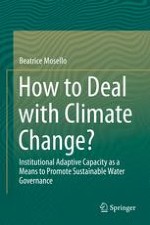2015 | OriginalPaper | Buchkapitel
6. Resistant, Reactive or Proactive Institutions? Exploring Adaptive Water Resources Management in the Po and Syr Darya River Basins
verfasst von : Beatrice Mosello
Erschienen in: How to Deal with Climate Change?
Aktivieren Sie unsere intelligente Suche, um passende Fachinhalte oder Patente zu finden.
Wählen Sie Textabschnitte aus um mit Künstlicher Intelligenz passenden Patente zu finden. powered by
Markieren Sie Textabschnitte, um KI-gestützt weitere passende Inhalte zu finden. powered by
